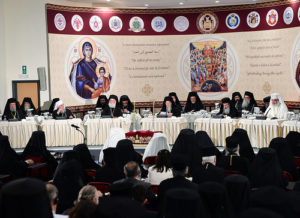In Defense of the Holy and Great Council
27 Ιουλίου 2016
Ecumenical Patriarch Bartholomew, during his opening address at the Holy and Great Council of the Orthodox Church, quoted the preacher with the golden mouth, St. John Chrysostom: “For the term ‘church’ is defined as a system and synod.”
Both the term ‘church’ and the system of synod have generated a great deal of discussion recently and regrettably some division as well.
Archbishop Anastasios of Albania remarked in his opening statement that the “Heresy of our time is egocentrism.” Following the Inaugural Session, I spoke with a well-known delegate about the Archbishop’s statement, and on the self-centredness of many monomaniacal critics of the Council.
One of his comments was especially insightful.
He compared them to the pope, and argued that unlike the Roman pontiff who is put there by others based on their history and tradition, these critics are self-appointed arbiters of the truth. The extreme positions and unfounded accusations they often espouse limit freedom and stifle debate.
Observing the Holy and Great Council at the Orthodox Academy of Crete last month, I witnessed differences among the delegates. Each bishop brought his own set of skills and experiences to the deliberations. A missionary bishop in Africa, for instance, will have a different outlook than a bishop from an Orthodox Christian country. Does this mean one is “more” Orthodox than the other?

There have been differences throughout the history of the Church; the Book of Acts describes the earliest ones. What it also describes, however, is how the apostles and elders came together to resolve disputes. They came together. They were well-intentioned and full of love. It is this spirit of Orthodox community and collaboration which should be nurtured in our days.
Alas, many in isolation have heaped heavy criticism (often directed at the Ecumenical Patriarchate and His All-Holiness Bartholomew) as a result of the text,Relations of the Orthodox Church with the Rest of the Christian World, and the application of the term ‘church’.
It is worth emphasizing here some pertinent points from the Council’s deliberations on this issue.
That the Orthodox Church is the only “One, Holy, Catholic, and Apostolic Church” there was never any question, uncertainty or indecision. None.
What a few delegates questioned was using ‘church’ to describe non-Orthodox Christian confessions – a mostly modern-day problem propagated by some self-appointed arbiters of the truth.
A number of bishops catalogued instances describing both Roman Catholic and Protestant confessions as churches. Examples include key Orthodox statements since the Seventh Ecumenical Council in 787: the Encyclical Letter of St. Mark of Ephesus (1440); the Replies of Patriarch Jeremiah II to the Lutherans (16th-century); and, the Reply of the Orthodox Patriarchs to Pope Pius IX (1848), among others.
The 1948 Orthodox Conference in Moscow (which included representatives from most autocephalous churches) was very critical of the Vatican, describing the “inimical innovations” brought by Rome and the “great evil on the unity of the Christian Ecumenical Church” they have caused. Despite these and other such statements, the Conference’s “Vatican and the Orthodox Church” resolution still used the term “Roman Catholic Church”.
The consensus (properly understood) of the Council was that it is neither contradictory nor hypocritical to confess the Orthodox Church as the One, Holy, Catholic, and Apostolic Church, while “accepting the historical name of other non-Orthodox Christian Churches and Confessions that are not in communion with her…”
A leading delegate emphatically stated that using ‘church’ to describe other Christian confessions does not mean Orthodoxy recognizes their ecclesiology since their faith is incomplete and lacking.
It bears re-emphasizing that there was no equivocation at the Holy and Great Council that only the Orthodox Church possesses the fullness of the Christian faith and has valid sacraments.
The storyline spread by many ultra-conservatives on this issue is not rooted in reality; the assumptions and corresponding claims made are disconnected from the deliberations in Crete.
What is required is care and vigilance. More broadly, resurrecting the Church’s synodal system (which Ecumenical Patriarch Bartholomew has worked tirelessly to do) is required to ensure that Holy Tradition is properly preserved and protected – from ultra-conservatives but also from ultra-liberals who wish to promote a secular spirit foreign to Orthodoxy.
The arbiter of truth is not anyone with an Internet connection, nor a metropolitan with a microphone.
Let us therefore escape the trap of “egocentrism” described by Archbishop Anastasios. Having an open mind and remaining faithful to Orthodoxy are not mutually exclusive. Whenever the Church faced external threats or internal upheavals, people of goodwill came together to collaborate and safeguard the unity of faith and Holy Orthodoxy. So it should be today.
Source: Huffington Post



